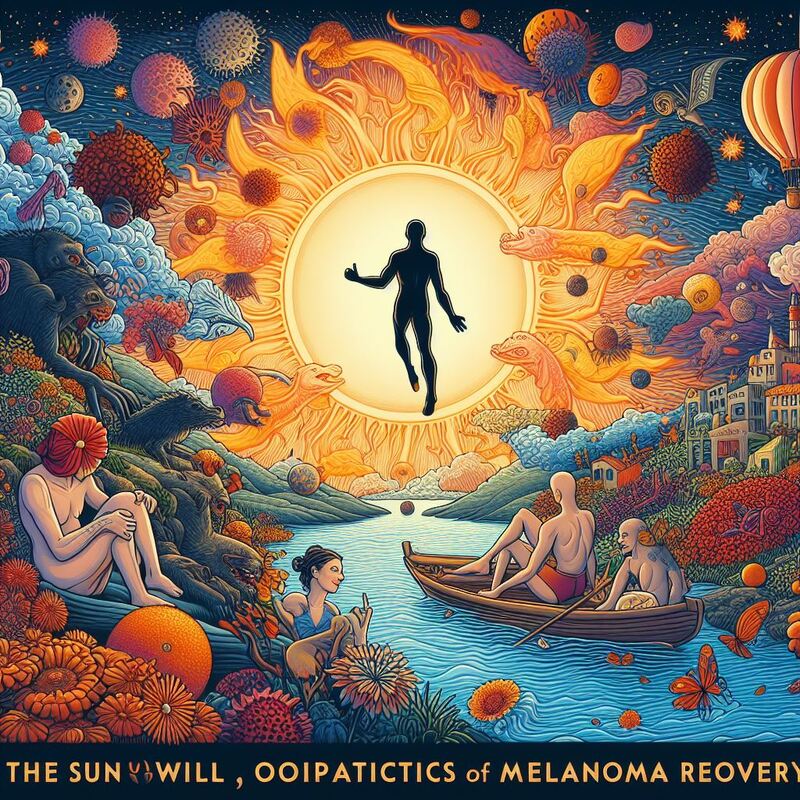Optimistic Tales of Melanoma Recovery
Optimistic Tales of Melanoma Recovery
The Sun Will Rise: Optimistic Tales of Melanoma Recovery
Melanoma, a diagnosis that often brings with it a heavy burden of fear and uncertainty, also carries stories of immense hope, resilience, and recovery. In this narrative, the focus shifts from the daunting statistics to the heartening tales of those who have faced melanoma and emerged on the other side with renewed spirit and optimism. This article explores the journeys of several individuals who, through their battles with melanoma, illustrate the human capacity for strength in the face of adversity and the ever-growing possibilities afforded by advances in medical treatment.
Early Detection: A Lifeline
Optimistic Tales of Melanoma Recovery
The tale of melanoma recovery often begins with the critical component of early detection. For Sarah, a 37-year-old school teacher and mother of two, the journey started with noticing a peculiar new mole during a routine self-exam. Prompted by the awareness campaigns she saw on social media, Sarah visited her dermatologist, leading to an early diagnosis of Stage I melanoma.
Early detection made a straightforward surgical removal possible, minimizing the need for more aggressive treatments. Sarah’s story underscores the power of awareness and the importance of regular skin checks. “It saved my life,” she says. “I’m more vigilant now and encourage everyone I know to be proactive about their skin health.”
Optimistic Tales of Melanoma Recovery
The Role of Cutting-Edge Treatments
Advances in treatment, especially over the last decade, have dramatically transformed the outlook for many melanoma patients. For Mike, a retired firefighter diagnosed with Stage III melanoma, the introduction of targeted therapies and immunotherapies opened up new avenues for treatment that weren’t available in years past. After undergoing surgery to remove several lymph nodes, Mike participated in a clinical trial for a new immunotherapy regimen.
This approach, which involved drugs that help the immune system recognize and fight cancer cells more effectively, led to a complete remission for Mike. “The progress in treatment over just a few years is astonishing,” he reflects. “It gives you a real sense of hope that wasn’t there before.”
Psychological Resilience and Community Support
Optimistic Tales of Melanoma Recovery
Recovery from melanoma isn’t solely a physical process. The psychological battle can be equally challenging. Emma, who was diagnosed with melanoma at the age of 30, found that her biggest challenge was dealing with the anxiety that came with her cancer diagnosis. Through counseling and by connecting with support groups, she found strength in shared experiences.
“These groups provided a space to share my fears and victories. I learned that my feelings were normal and that I wasn’t alone,” Emma shares. Community support, whether through formal support groups or informal networks, plays a vital role in the emotional recovery process, offering a foundation of shared understanding and mutual encouragement.
Innovations in Follow-Up Care
Optimistic Tales of Melanoma Recovery
As treatments improve, so too do strategies for follow-up care, which is crucial for catching potential recurrences early and managing the long-term side effects of treatment. Innovations in digital health, such as telemedicine and mobile health apps, have made follow-up care more accessible and efficient.
James, a tech-savvy entrepreneur, leveraged these new tools to stay on top of his health after beating Stage II melanoma. He uses an app to track changes in his skin and maintains regular virtual consultations with his oncologist. “Technology has simplified the way I manage my health post-recovery. It’s reassuring to know that I can easily reach my doctor and monitor my skin,” James explains.
Lifestyle Changes and Prevention
Optimistic Tales of Melanoma Recovery
Post-recovery, many melanoma survivors find themselves adopting new lifestyles, particularly regarding sun safety. Linda, a keen marathon runner, didn’t let her melanoma diagnosis stop her passion. Instead, she adapted her training to protect her skin, running during cooler, less sunny times, wearing UV-protective clothing, and applying high-SPF sunscreen regularly.
Linda’s commitment extends beyond personal changes; she now organizes annual charity runs to raise funds for melanoma research. “I want to use my experience to make a difference. Every runner we get is another person educated about melanoma and sun safety,” she says.
The Power of Positive Thinking
Throughout these stories, a common theme emerges: the power of a positive outlook. John, who faced a grim prognosis after being diagnosed with advanced melanoma, credits his recovery to the relentless positivity and the support from his family and medical team. “Every day, I focused on the positive aspects of my life—my family, friends, and the small victories in treatment,” John notes. This mindset, researchers suggest, can significantly impact recovery by reducing stress and promoting psychological resilience.
Optimistic Tales of Melanoma Recovery
Looking Forward
The narratives of those who have faced melanoma and recovered offer more than just hope; they provide tangible examples of how far we have come in understanding and treating this once-dire diagnosis. These stories also serve as powerful motivators for the continued push for better treatments, more accessible preventative measures, and broader awareness.
As these survivors show, the journey through melanoma is undoubtedly challenging, but it is also one filled with victory and vitality. They are not just survivors; they are advocates, educators, and inspirations. As the medical community continues to make strides in treatment and care, and as awareness grows, the outlook for melanoma patients continues to brighten. Indeed, for many, the sun will rise after melanoma, shining brightly as a symbol of new beginnings and restored health.

Optimistic Tales of Melanoma Recovery